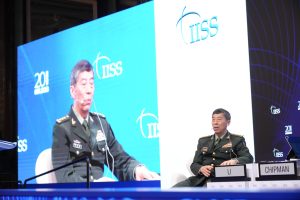The tenor of the annual Shangri-La Dialogue (SLD), Asia’s premier security conference, has changed dramatically for the worse. Its 20th iteration, held in Singapore over the weekend, was partly a culmination of growing tensions in the Indo-Pacific between rival hegemonic powers, the United States and China. It began early, when Chinese Defense Minister Li Shangfu rejected a face-to-face meeting with his American counterpart Lloyd Austin, until the U.S. “corrected its mistaken actions,” with speculation that it was because of prior incidents, including former U.S. Speaker of the House Nancy Pelosi’s visit to Taiwan and incidents involving Chinese spy balloons in February.
Austin’s speech didn’t exactly invite the Chinese to calm tensions. In his “Shared Vision for the Indo-Pacific,” the Defense Secretary boasted about the increased U.S. defense capacity in the region, from the deployment of the 12th Marine Littoral Regiment to Japan to protect the First Island Chain, as well as the $9.1 billion boost in military spending for the Pacific Deterrence Initiative.
Li’s address to the SLD was no less confrontational. After a dangerous encounter in the Taiwan Strait, China used the speech as an opportunity for rebuttal, stating that the encounter was caused by “hegemonic actions” caused the dispute and that China “must prevent attempts [by those] who want to use freedom of navigation and innocent passage as pretexts to exercise hegemony of navigation.” China has long worried about the expansion of Quad activities, such as technology transfers, and the AUKUS security pact, which will eventually allow Australia to get nuclear-powered submarines.
The problem is that the high-level SLD addresses garner the bulk of international media attention, which set the tone for how the rest of the dialogues are covered, if at all. The Japan Times’ headline a day after Li’s speech read, “China’s defense chief slams U.S. military operations near his country’s territory.” Reuters went to press with “China says clash with US would be ‘unbearable disaster’.”
These bleak headlines, emboldened by caustic speeches from senior military figures detract from actual dialogue, and instead utilize the Singaporean stage to send subtle and not-so-subtle messages to partners and rivals across the region. It’s not that regional allies haven’t noticed it. In his own keynote speech, Australian Prime Minister Anthony Albanese noted that greater engagement between the United States and China is necessary, as a breakdown in dialogue could have devastating consequences.
To combat unnecessary posturing, the SLD needs to change, and part of that change needs to come from the leadership of the host, the International Institute for Strategic Studies (IISS). Of the six Special Sessions and corresponding question and answer periods, very few of the panelists were from China, and there was almost no Chinese participation in very important sessions such as the “Challenges of Asia-Pacific Military Capability Development.” In that session, IISS fellows dominated the discussion. Worse, Chinese participation in many of the seven plenary sessions was sparse at best.
The SLD needs to prepare sessions that encourage responsible conciliatory discussion and issues that foster U.S.-China cooperation. There are many issues of importance, barely evident from the media reports. Where can joint cooperation exist on issues of climate change adaptation and mitigation, a major security issue that transcends state constructions such as sovereignty, national boundaries, or traditional notions of security? Both Washington and Beijing are equally wary of the implications of artificial intelligence, albeit for different reasons.
Years ago, under the Obama administration, there was a concerted effort, despite growing differences, to bring China to the table. At the time, Defense Secretary Chuck Hagel told SLD attendees that the U.S. welcomed “a strong and emerging and responsible China.” A Council on Foreign Relations wrap-up noted that U.S. and Chinese military leaders “took the time to build personal ties.”
It’s no longer acceptable just to bring China to the Dialogue. The IISS, Washington, and Beijing itself must work to increase communication. It’s time to package the SLD around critical areas of concern that can actually facilitate cooperation rather than creating an occasion for ill-tempered speeches that merely illustrate the growing Indo-Pacific divide. Otherwise, future iterations of the SLD will be just more of the same – absolutely forgettable.

































